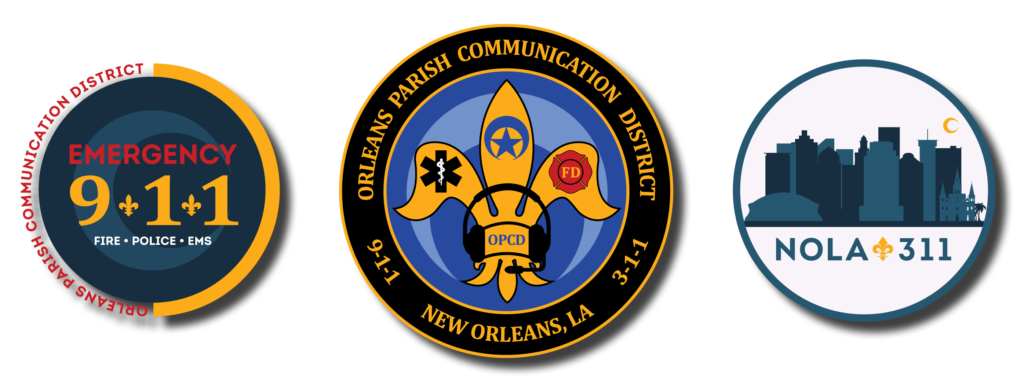
Contact: Chelsea Porché
Public Engagement Manager
504-508-0366
cporche@opcdla.gov
FOR IMMEDIATE RELEASE
OPCD, in Coordination with the City of New Orleans, NOHD and NOPD
Announce the Launch of Alternative Dispatch Pilot Program
NEW ORLEANS, LA (August 20, 2021) – The Orleans Parish Communication District, in collaboration with the City of New Orleans, New Orleans Health Department and New Orleans Police Department, announced the launch of the City’s Alternate Dispatch Pilot Program designed to provide alternative forms of response to emergency calls relating to mental health.
“The alternative dispatch pilot program that we have implemented allows us to be more data-driven and will overall help shape this system in a way that better suits our needs as a city,” said Mayor LaToya Cantrell. “The alternative dispatch system is a necessary tool to not only allow our first responders to focus on our more critical public safety needs as a city, but to also improve outcomes for individuals who experience a behavioral health crisis. This new program is just one of many ways that we are being more intentional in our holistic approach in reducing violent crime here in our city.”
The alternative dispatch pilot program, launched on Thursday, August 12, 2021, is designed to redirect emergency calls for service relating to non-violent mental health incidents to licensed mental health providers in lieu of uniformed law enforcement officers. During the duration of the pilot program, calls for service within the New Orleans Police Department’s 3rd District for calls for service relating to non-violent mental health incidences will be referred to the Metropolitan Human Services District (MHSD) for triage, treatment and response.
Annually, OPCD receives thousands of calls for assistance for individuals suffering with mental illness and need assistance. Utilizing approved protocols in the Police Priority Dispatch System (PPDS) of the International Academies of Emergency Dispatch (IAED), OPCD triages and prioritizes law enforcement calls for service, including mental health emergencies. In alignment with emergency communications best practices, OPCD has partnered with the City of New Orleans, NOHD and NOPD in order to implement this pilot in hopes of the program being permanently adopted, city-wide.
“This program did not come to being by chance,” stated OPCD Executive Director, Tyrell Morris. Mayor Cantrell and the public safety leaders of New Orleans have been working on this for more than a year. This has been a methodical process where data and science surrounding mental health have been thoroughly reviewed and applied so we can meet people where they are, which is allowing us to continue to meet our mission of getting the right people to the right place at the right time better than anyone else in the world”.
Alternative dispatch models that are integrated with 9-1-1 and deploy mobile crisis outreach teams (MCOT) to respond to behavioral health emergencies are quickly becoming a best practice. Based on evidence from various other cities, an alternative dispatch model has the potential to improve outcomes for those experiencing behavioral health crises, strengthen connections between existing behavioral health resources, and reduce burden on NOPD.
“This has been a project long in the making,” stated New Orleans Health Department Director, Dr. Jennifer Avegno. “The concept is simple: when your house is on fire, you call 9-1-1 and the fire department responds because they are experts with that type of emergency. When there is a violent incident, you call 9-1-1 and the police department responds because that is what they are trained to do. Mental health emergencies are a different type of emergency that falls outside the scope of NOPD, NOFD or New Orleans EMS, and it needs an appropriate response. To continue providing emergency response that does not actually help anybody not only stretches our first responders thin, but does not provide the person involved with the care they need. The aim of this pilot program is to be a first step in remedying these problems.”
Many emergency calls are unrelated to fire, violent crime, or medical issues, but, until the launch of the pilot program, first responders from those agencies have been the only professionals c available for response – creating a mismatch between need and service. The alternative dispatch model has the potential to both improve outcomes for individuals who experience a behavioral health crisis and to reduce the cost burden on police and first responders. As an example: in Eugene, Oregon, the city’s alternative dispatch program saves an estimated $8.5 million per year in police response costs.
“Today we are truly excited to team up with the city’s public safety team,” stated NOPD Superintendent, Shaun Ferguson, “and a team of dedicated mental health professionals to implement an alternative way of responding to mental illness calls. We hope we will better serve our citizens and reduce the number of calls where our officers are needed.”
During the duration of the alternative dispatch pilot, management partners will evaluate the data, weekly, to make determinations regarding the future of the program.
For any questions, please contact OPCD Public Engagement Manager, Chelsea Porché, at 504-508-0366 or cporche@opcdla.gov
About the Orleans Parish Communication District (www.OPCDLA.gov)
Formed in 1982, the Orleans Parish Communication District is the PSAP for all emergency communications via 9-1-1, and non-emergency communications via 3-1-1, within Orleans Parish. The agency employs over 150 individuals and provides emergency medical dispatch, emergency fire dispatch, and emergency police dispatch for the millions of annual visitors and residents of the City of New Orleans. OPCD is a member of the Association of Public Safety Communication Officials (APCO) and the National Emergency Number Association (NENA).
The Mission of OPCD is to get the Right People to the Right Place at the Right Time, Better than Anybody Else in the World.
###

